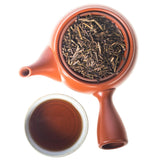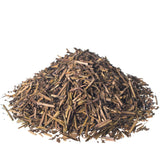A monk asked the wise tea master Lao Cha:
– Sensei, I want a green tea that is so roasted that it tastes more like Chinese hongcha – what Westerners call "black tea". Is it even possible to find something like this?
– Of course, young novice. Have you heard of Hojicha tea, which has a low caffeine content, made from roasted kukicha? It's one of the most popular teas in Japan!
Hojicha is a Japanese green tea with a unique production process. Hojicha is made by roasting kukicha (tea twigs) instead of tea leaves, which results in a tea with low caffeine content. Stems are packed with L-theanine – an amino acid that helps to relax and reduce stress and anxiety. Hojicha's particularly low caffeine content makes this Japanese tea the perfect choice for an after-dinner tea, safe even for kids. So, you can say that it's a caffeine-free green tea.
Unlike other Japanese green teas that are only steamed, Hojicha tea goes through one more step: roasting. The long charcoal roast imparts a sweet, nutty, caramel-like taste and a very smooth mouthfeel. For those who aren't fond of the more vegetal, astringent notes of green tea, Hojicha green tea could be the ideal option.
Like many other discoveries, Hojicha is also a result of an accident. In 1920, a Kyoto merchant had some bancha he wasn't able to sell. By roasting it, he created a new flavor. Thus, Hojicha was born. It quickly took off due to its mild, sweet taste, fragrant caramel notes and lack of astringency. Its popularity persists to this day.
Our Hojicha uses almost exclusively the first flush springtime harvest of the Yabukita cultivar. It grows in a family tea garden on the verdant slopes of the mountain in Shizuoka, Japan. Shizuoka is Japan's largest tea-producing region. It accounts for approximately one-third of Japan's total tea production. Shizuoka has a rich tea history, growing tea for over 800 years. It is one of the original places where tea seeds were brought from China by the Zen Buddhist monk Eisai. Many mountainous areas dot Shizuoka's landscape. The volcanic soil is rich in nutritional substances and trace minerals. They get sucked in by the roots of the tea plant and create the unique flavor profile of this specialty tea.
The tea is forgiving of high temperatures, and longer brew times bring out its taste notes. The easy brewing method makes this tea a natural everyday choice for both experienced tea drinkers and novices.
Due to the roasting, this tea is best brewed at higher temperatures. We recommend starting with 200°F / 95°C hot water for the first infusion and gradually increasing it for subsequent infusions. Recommended time for the first infusion is 2 min. Steep for 1 minute for the second one, adding +30 seconds to each subsequent brew.
Brewing guidelines:
![]() 200℉ / 95℃ for the first infusion; Keep raising water temperature for subsequent infusions
200℉ / 95℃ for the first infusion; Keep raising water temperature for subsequent infusions
![]() 1g per 50ml
1g per 50ml



